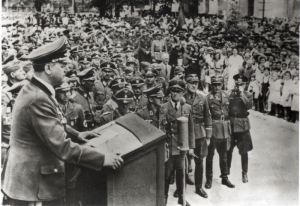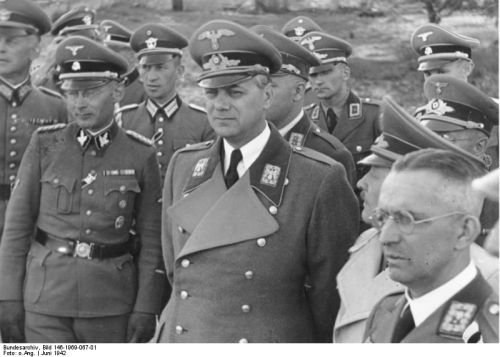Alfred Rosenberg

Alfred Rosenberg - Speaks in the East
Alfred Rosenberg was born in Reval in Estonia on the 12 January 1893, the son of an Estonian mother and a Lithuanian father, both of Baltic German extraction. Rosenberg studied engineering in Riga and architecture at the University of Moscow, fleeing to Paris and then Munich after the Russian revolution of 1917. Rosenberg was active in White Russian émigré circles and also a member of the ultra-
Rosenberg had the typical “Germanity” complex of expatriate Germans from the border regions, he joined the Nazi Party in 1919 and was introduced to Hitler by Dietrich Eckart, whom he eventually succeeded as editor of the Nazi newspaper, the Volkische Beobachter, in 1923. Rosenberg was an important figure in the early days of the Nazi movement; Rosenberg impressed Hitler by his “learning,” largely from the cranky, tract literature of pathological nationalist fanaticism, as well as by his virulent anti-
Hitler’s adviser on foreign affairs in the period of the so-
In 1930 Rosenberg was elected to the Reichstag as deputy for Hessen-
As head of the Party Foreign Affairs Department from 1933 to 1945 he was nominally responsible for Fascist parties in other countries, although in practice this was limited to contacts in Eastern Europe and the Balkans. In 1934 Rosenberg was appointed the Fuhrer’s Delegate for the Entire Intellectual and Philosophical Education and Instruction of the National Socialist Party. Rosenberg dreamed of a great Nordic empire under German leadership, brought off one of his few diplomatic coups when he brought the Norwegian fascist leader Vidkun Quisling to Germany in December 1939 to facilitate a German invasion of Norway, which indeed took place in April 1940.
In 1939 Rosenberg established in Frankfurt –am – Main his “Institute for the Investigation of the Jewish question,” declaring in his opening speech that “Germany will regard the Jewish Question as solved only after the last Jew has left the Greater German living space.” The primary mission of the Institute was the looting of European Jewish library treasures, archives and art collections from their owners to promote Rosenberg’s grandiose plans of “scientific and cultural research.” A special unit called the “Einsatz Reichsleiter Rosenberg” were busy since October 1940 confiscating the great art treasures of France and other occupied countries, with the help of the Wehrmacht and transporting them to Germany. According to Rosenberg himself, art objects of all kinds to the value of one billion Reichsmarks had been sequestered from France alone by January 1941.
He had a free hand to sequester all “ownerless” Jewish property in France, Belgium and Holland, as well as organising special squads to confiscate research material and cultural goods belonging to Freemasons. While demonstrating that he could rival other Nazi leaders in acts of blatant robbery, he was an incompetent administrator as demonstrated by his tenure as Minister for the Occupied Eastern Territories, to which he was appointed by Hitler on the 17 July 1941.
As far as the Jewish population were concerned, Rosenberg’s Ostministerium differed only in detail, not the intent, characterised by the policy of initial confinement in ghettos for the larger towns followed by extermination, as decreed by Himmler and Heydrich. Similarly, Rosenberg supported the brutal Germanisation of the native population, particularly in the so-
Though the Ostministerium in Berlin had sole legal authority to issue policy, the Kommissars often disregarded its directives and followed their own inclinations, administering through the sub-
The aim of our policy to me, therefore, appears to lie in this direction: to resume in an intelligent manner and sure of our aim, the aspirations to liberation of all these people (the imprisoned nationalities of the Soviet Union) and to give them shape in certain forms of states, i.e. to cut state formations out of the giant territory and to build them up against Moscow, so as to free the German Reich of the Eastern nightmare for centuries to come.
This plan certainly had romantic appeal for Hitler, but privately Hitler rejected Rosenberg’s principles-
Small sovereign states no longer have a right to exist, the road to self government leads to independence. One cannot keep by democratic institutions what one has acquired by force.
Hitler’s own view, which he was to express at the notorious July 16 1941 conference on the future of the occupied East was:
While German goals and methods must be concealed from the world at large, all the necessary measures – shooting, exiling, etc – we shall take and we can take anyway. The order of the day is first conquer, second rule and third exploit. Sometimes it is hard to understand why Hitler ever installed Rosenberg as chief of the Ostministerium or gave even qualified endorsements to his schemes. Rosenberg was no match for either Himmler or Bormann who saw in the distant future, the long term benefits of controlling an Eastern empire, for their own political aspirations. Rosenberg’s great weakness was that he had no personal corps d’elite and the quality of the material from which he was compelled to staff his ministry. Bormann on the other hand had at his disposal the mass of the SA, rendered powerless by the Night of the Long Knives in 1934. From its first day the Ostministerium was subjected to a double stress – from Himmler who wished to sterilise it completely, and from Bormann, who tried to staff its senior posts with his own nominees.
Once Soviet territory had fallen to the Germans relations deteriorated to such a degree that Hitler was obliged to step in and he called another conference on the 16 July 1941, Heinrich Himmler was not present but Goring, Rosenberg and Bormann all took part with vigour, and there were some undignified scenes -
Wilhelm Kube the General Commissar for Belorussia, based in Minsk was increasingly frustrated by the constant encroachment by the SS on his jurisdiction and their treatment of the Jews which led to a disagreement with SS-
In the Ukraine, Reichsmarschall Goering was better served, for at the previously mentioned conference his own nominee, Erich Koch, had been chosen for the Commissariat.Rosenberg had protested vigorously against this choice believing with some reason that the whole of his delicate and crack –brained scheme for racial discrimination would be placed in jeopardy by a man who was already notorious for sadistic taste and corrupt practices. The Ostminister had also considered the close personal friendship between Koch, Bormann, and Goering, and the direct link which is subordinate would thereby enjoy with the Führer.

Alfred Rosenbeg next to Koch (Bundesarchiv)
Koch and Rosenberg fought a running battle over Koch’s brutal reign over the Ukraine, Rosenberg complained: “Koch, through various remarks to officers of the OKW, has given the impression that he has the privilege of reporting directly to the Führer and, in general, that he intends to reign without reference to Berlin. Similar remarks to the effect that he made policy have been made to my associates. I have made it clear to him that a distinct relationship of subordination exists. Thereafter, Hitler agreed to see Koch only in Rosenberg’s presence. Poor Rosenberg! At the very moment when he was locked in combat with Koch he was distracted by interference from a new and unexpected quarter. For he found that his principles were being taken up and pushed hard by yet another organisation, which, although the last to climb on the band-
Ribbentrop was pressing this, not because of humanity but because he thought that the war with the Soviets would be over within months and large parts of the world would be under Hitler’s reign. A week before the invasion of the Soviet Union Ribbentrop wrote to Dr Hans Heinrich Lammers, Head of the Reich Chancellery:
The territory to be occupied by German troops will on many sides border foreign states, whose interests will thereby be most strongly affected. The Foreign Office cannot acquiesce in the absence of on-
Rosenberg was incensed and threatened and after several months of correspondence, urgent and clandestine approaches to Adolf Hitler, farcical and complicated manoeuvres, with temperatures rising, Rosenberg won the day. Adolf Hitler sent for Ribbentrop and put him straight in a “down –to-
The files on all the émigrés in Berlin were turned over to Rosenberg and in due course fell into the hands of Himmler, who threw most of the persons named in the files into concentration camps. Whilst the Ostministerium was busy repelling the Foreign Ministry with the Fuhrers help, Koch tightened his grip on the Ukraine; there was an orgy of sadism against the Ukrainian population, including the Jews. Rosenberg explained in one of his many letters of reproof to Koch, that “there exists a direct danger that if the population should come to believe that the rule of National Socialism would have even worse effects than Bolshevik policy, the necessary consequences would be the occurrence of acts of sabotage and the formation of partisan bands. The Slavs are conspiratorial in such matters.”
Rosenberg wrote outraged reports in the autumn of 1942, concerning conditions under Koch’s reign of terror and protesting about the barbarous treatment of Soviet Prisoners of War, but Hitler did not respond. His personality was far too weak for the likes of Himmler, Bormann and Goering, who all had different plans for the occupied territories, and the same could be said for the brutal SS and police leaders, who carried out exterminations and deportations unchecked by his Ministry. His empire in the East was no more than a “paper empire.”
At the International War Crimes Trial in Nuremburg Alfred Rosenberg appeared as a pathetic broken figure, who blamed the degeneration of the National Socialist “Idea” on his more successful adversaries in the struggle for power. Rosenberg was accused of complicity in the plan to exterminate Jews, found guilty and hanged on the 16 October 1946.
Sources
Who’s Who in Nazi Germany by Robert S Wistrich, published by Routledge, London 1995
History of the Second World War, published by Purnell London 1966
Leaders and Personalities of the Third Reich by Charles Hamilton, published by R.James Bender Publishing. San Jose, USA 1984.
Photograph – Imperial War Museum and Bundesarchiv
© Holocaust Historical Society 2019

